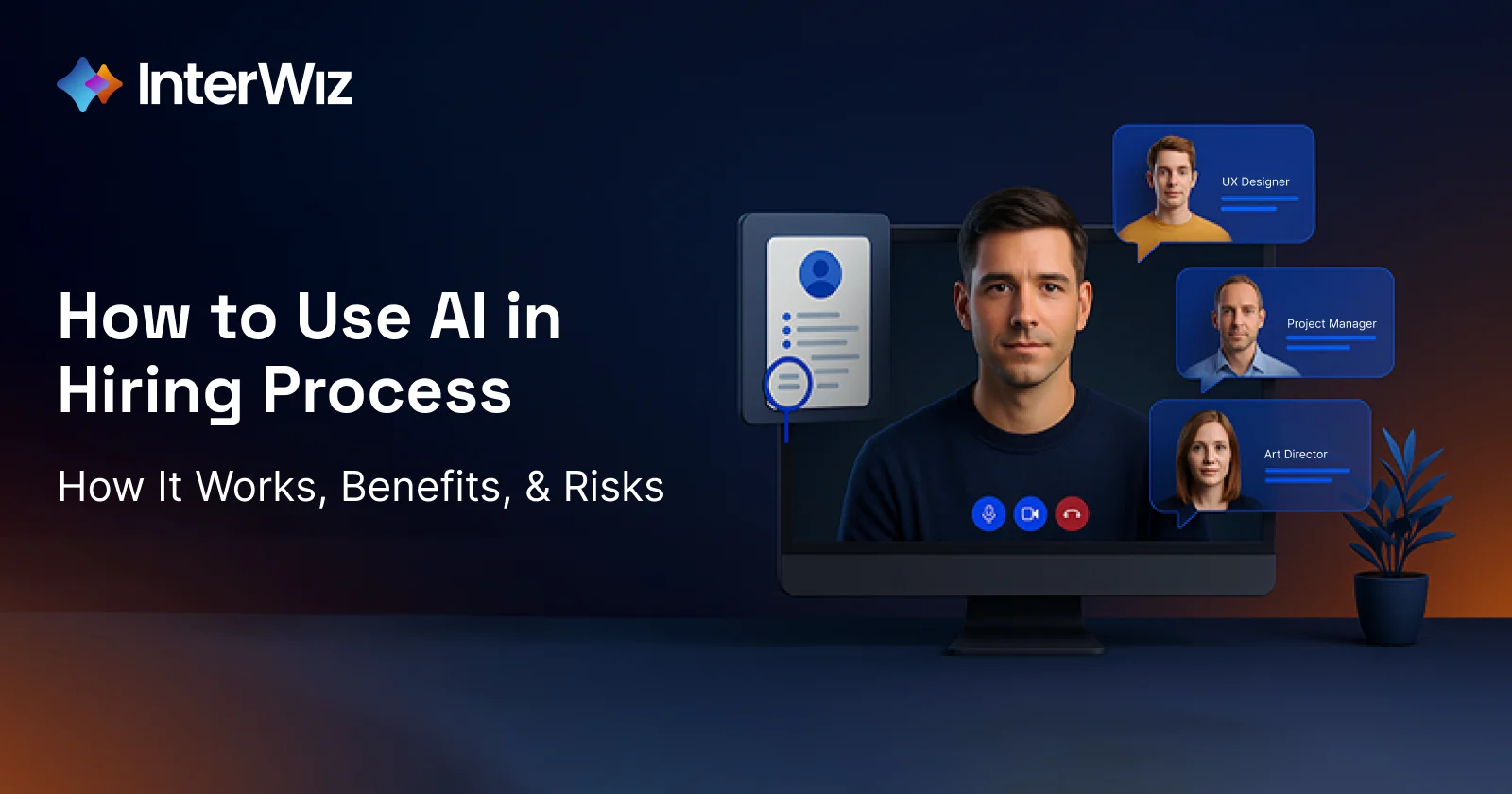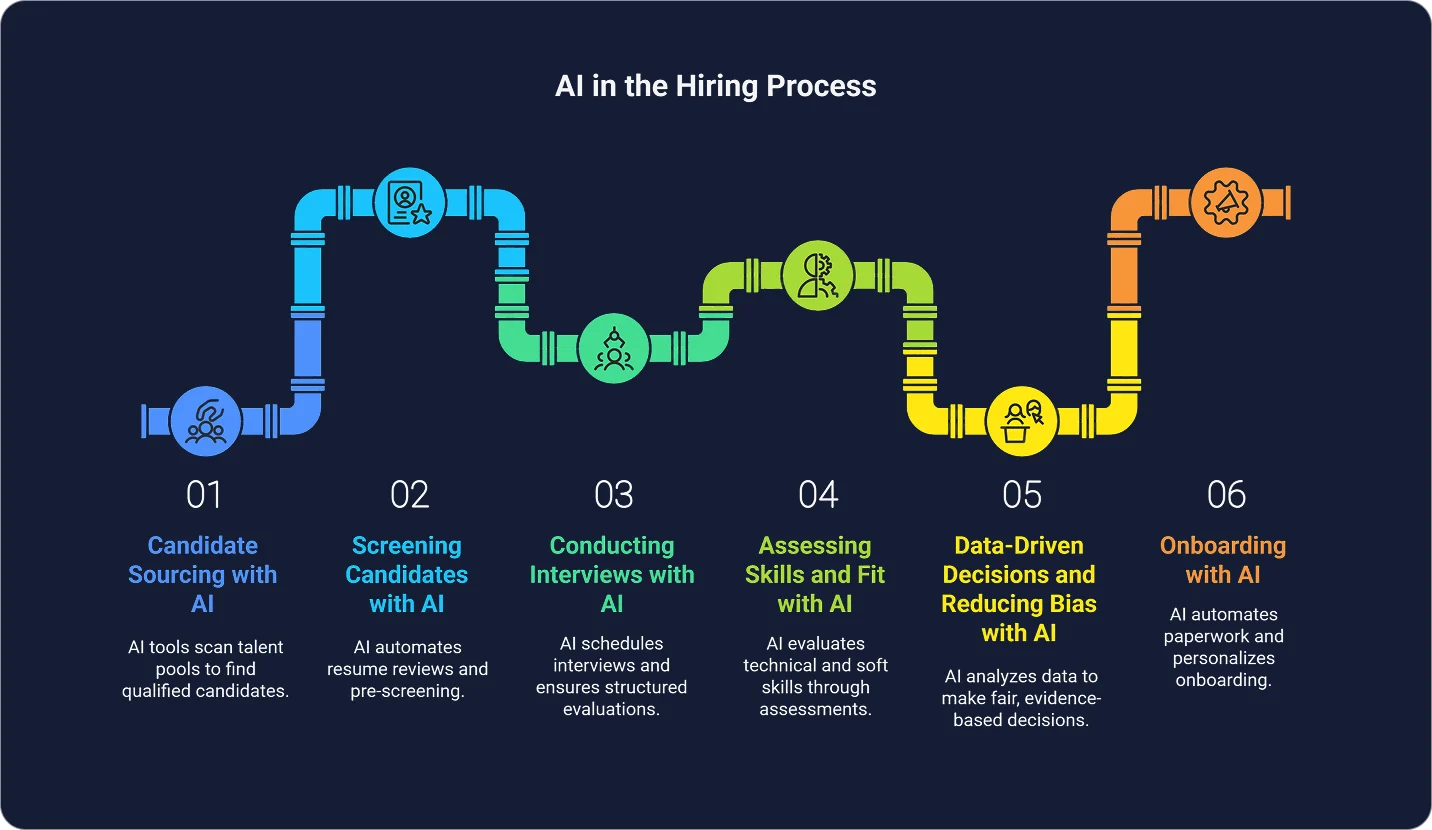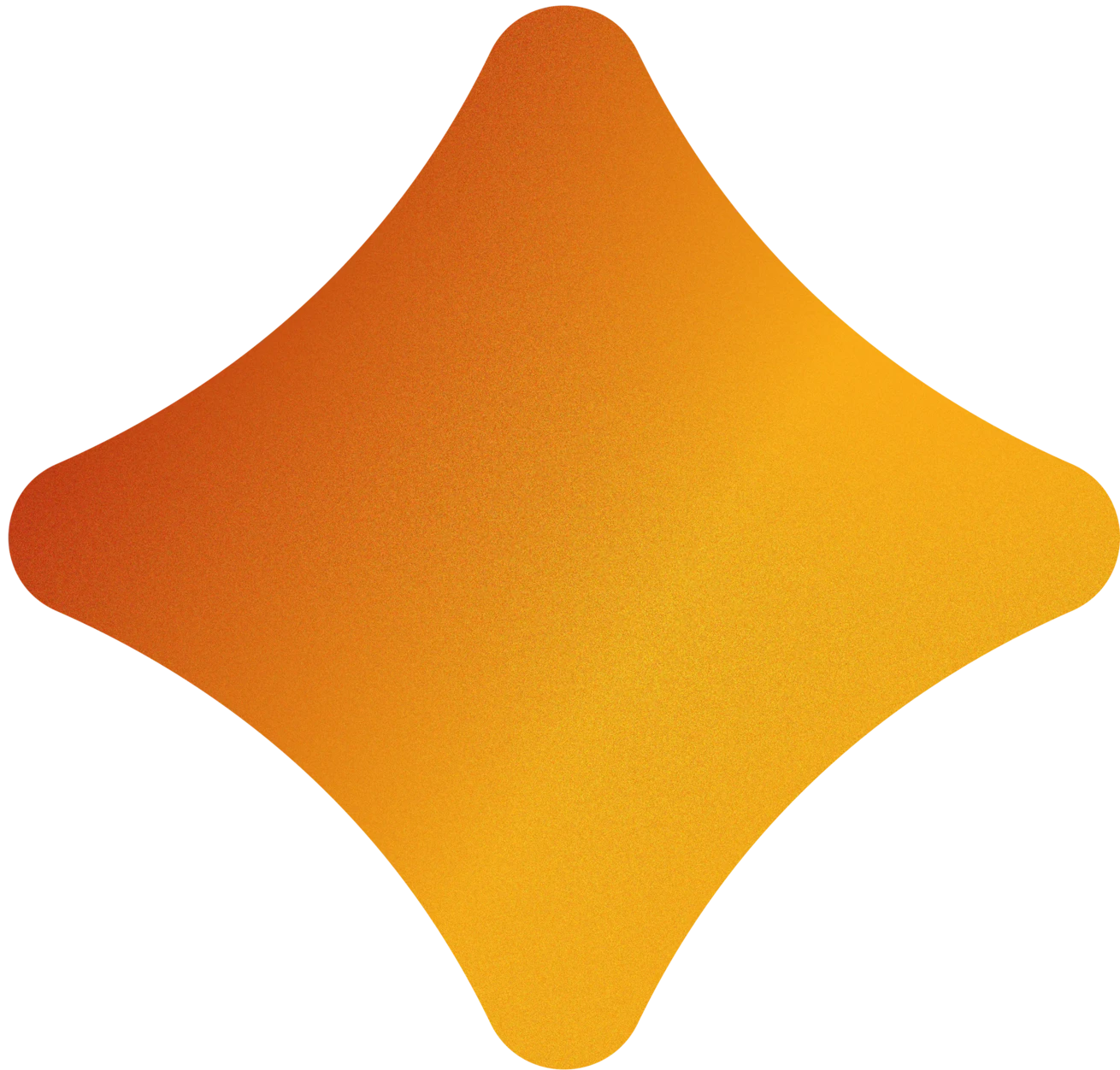Hiring Best Practices
How to Use AI in Hiring: A Step-by-Step Guide for Modern Recruiters

Hiring has never been more demanding, with roles staying open for 22–43 days and costing companies over $4,700 per position (SHRM). Recruiters and HR teams spend hours screening resumes, drafting job descriptions, and scheduling interviews. In the meantime, top candidates often move on to faster offers.
This is where artificial intelligence comes in. AI recruiting tools automate repetitive tasks, highlight the right candidates, and reduce bias in the process. Nearly two-thirds of HR professionals already use AI in recruitment (SHRM, 2023). These systems aren’t replacing people, they’re helping recruiters speed up the process, improve candidate engagement, and make hiring more consistent.
This guide shows how to use AI in hiring, from sourcing to onboarding, highlighting its role in the recruitment process and tips for HR professionals.
Key Takeaways:
AI in hiring automates time-consuming tasks, such as sourcing, screening, scheduling, interviewing, and evaluation, allowing recruiters to focus on engaging top talent.
AI interview tools reduce bias, enhance candidate matching, and facilitate data-driven decisions for more equitable and efficient hiring.
Start implementing AI where your recruitment process faces the biggest bottleneck, and expand gradually for smoother, more efficient hiring workflows.
What Recruitment Challenges Is AI Solving Today?
Most recruiting teams face the same obstacles:
Screening resumes is time-consuming and often inconsistent.
Scheduling interviews eats up valuable time.
Human biases creep into evaluations, making it harder to assess soft skills or cultural fit fairly.
Every delay increases the risk of losing top talent to faster-moving competitors.
These pain points compound into longer hiring cycles, higher costs, and a poor candidate experience.
The Immediate Value of AI
AI recruiting tools structure the process by automating repetitive tasks and applying machine learning to candidate data, AI improves efficiency and fairness in the hiring process. Recruiters can filter qualified candidates faster, reduce unconscious bias, and spend more time engaging with top talent.
Practical Steps to Using AI in the Hiring Process
Now that we understand how crucial AI is to structured and unbiased hiring, let’s walk through each step of the hiring process and explore how AI tools help improve it.

Step 1: Candidate Sourcing with AI
Candidate sourcing involves countless hours of resume reviews, LinkedIn searches, and manual outreach, a process that’s slow and exhausting. AI accelerates this stage by rapidly scanning vast talent pools, identifying both active and passive candidates who match the role’s requirements, and enabling recruiters to focus their efforts on engaging the best prospects.
How AI helps in sourcing:
Search at scale: AI sourcing tools like SeekOut scan 800M+ profiles and highlight diverse talent (Josh Bersin).
Discover passive candidates: AI-powered platforms surface skilled professionals who aren’t applying but fit the role.
Smarter matching: Natural language processing (NLP) algorithms link job descriptions with relevant skills and career paths.
Personalized outreach: Generative AI tools draft tailored messages that improve candidate communication.
Support diversity hiring: AI recruitment technology focuses on ability and experience, not just pedigree.
Example: Vodafone utilized Eightfold AI to reduce sourcing time and expand its pool of qualified candidates by matching skills and career growth (Eightfold AI).
Step 2: Screening Candidates with AI
Once candidates are sourced or apply directly, the next challenge is deciding who to move forward with. Manual resume reviews are time-consuming and often lead to inconsistent decisions. AI streamlines this process by quickly ranking candidates based on skills and job fit, making shortlisting more efficient and fair.
How AI helps in screening:
Parse resumes automatically: ATS platforms like Recruitee extract key details and rank candidates against job requirements.
Conversational pre-screening: Chatbots, such as Paradox Olivia, ask basic questions about availability or qualifications, instantly filtering out mismatches.
Reduce human bias: AI systems ignore demographic data, focusing only on job-relevant skills.
Faster responses: AI provides candidates with quick updates, improving engagement and reducing drop-offs.
Example: Unilever used AI games and video assessments to screen early-career applicants, cutting recruiter review time by 75% (Business Insider).
Step 3: Conducting Interviews with AI
Even after screening, interviews often create new bottlenecks, such as scheduling conflicts, uneven questions, and unconscious bias, which can derail the process. AI interview tools bring consistency and efficiency to keep things moving.
How AI helps in interviews:
Automated scheduling: AI assistants coordinate calendars, send reminders, and cut back-and-forth emails.
Structured interviews: Platforms like InterWiz conduct standardized interviews, ensuring that every candidate receives the same questions and evaluation criteria.
Objective scoring: AI-powered tools assess candidate responses against predefined rubrics, reducing unconscious bias.
Interview analytics: AI interview tools like InterWiz provide candidate rankings, transcripts, and data insights, helping hiring managers focus on responses rather than appearance.
Example: InterWiz streamlines the interview process by automating scheduling and conducting structured interviews. It evaluates both technical and soft skills and provides objective candidate scoring to support fair and efficient hiring decisions.
Step 4: Assessing Skills and Fit with AI
Interviews show communication and personality, but they don’t always reveal technical or cognitive ability. That’s where AI-powered assessments give recruiters a clearer picture.
How AI helps in assessments:
Test hard skills: Platforms like InterWiz, HackerRank, and Codility auto-grade coding tasks, checking accuracy, efficiency, and problem-solving.
Measure soft skills: Tools like Pymetrics use gamified tests to evaluate traits such as memory, risk-taking, and learning agility.
Role-specific evaluation: InterWiz combines AI-led interviews with coding challenges, language tests, and personality insights to ensure a rounded view.
Consistency at scale: AI ensures every candidate takes the same test, scored uniformly by the same algorithm, eliminating human subjectivity and promoting fair, consistent evaluations.
Example: Unilever used Pymetrics games to assess entry-level candidates, reducing reliance on resumes and hiring its most diverse class to date (Business Insider).
Step 5: Data-Driven Decisions and Reducing Bias with AI
Choosing the right candidate isn’t just about gut instinct anymore. Today, AI empowers recruiters and hiring managers to combine data from sourcing, screening, interviews, and assessments, enabling them to make fairer, evidence-based decisions backed by comprehensive insights.
How AI supports decision-making:
Candidate ranking: Platforms like InterWiz and Eightfold AI score applicants based on skills, experience, and predicted success in the role.
Bias reduction: Tools anonymize résumés or provide transcript-only reviews, ensuring decisions focus on qualifications, not demographics.
Predictive analytics: AI highlights which candidates are most likely to succeed or stay longer by analyzing patterns in past hiring data and candidate attributes, improving quality-of-hire.
Compliance support: Regular audits and explainable AI models help HR teams meet legal requirements under EEOC and GDPR.
Example: InterWiz shifted to transcript-based analysis so managers could review answers without seeing appearance or hearing accents, reducing unconscious bias.
Step 6: Onboarding with AI
The hiring process doesn’t end with an offer. A smooth onboarding experience sets the tone for retention and productivity. AI helps HR teams automate admin work and personalize the first weeks for new hires.
How AI helps in onboarding:
Automate paperwork: Chatbots guide new hires through forms, ID checks, and policy acknowledgments.
Faster setup: AI systems trigger IT account creation, equipment orders, and training assignments automatically.
Personalized learning: Adaptive platforms recommend training based on role, skills, and career goals.
24/7 support: Virtual HR assistants answer common questions about benefits, schedules, or company policies.
Example: Companies using AI-driven onboarding tools reported that employees onboarded with AI were 30% less likely to quit within a year (Paychex).
Where Recruiters Should Start with AI in Hiring
With so many AI tools available, it’s natural to wonder where to begin. The key is simple: start with the biggest pain point in your hiring process, then expand step by step. You don’t need six platforms at once.
How to choose your starting point:
If sourcing takes too long: Use AI sourcing tools like SeekOut or Eightfold AI to uncover both active and passive candidates.
If resumes pile up: Try AI screening systems or chatbots (e.g., Recruitee, Paradox Olivia) to filter applications quickly.
If interviews lack consistency: An AI-led interview platform like InterWiz covers more than just interviews. It handles scheduling, runs structured Q&As, evaluates technical and soft skills, and delivers end-of-interview scoring to support fair decisions.
If your team is small or scaling fast: Prioritize integrated solutions that automate multiple steps instead of juggling separate tools.
Takeaway: Don’t try to implement everything at once. Begin with the stage that slows you down most. For interviews, candidate scoring, and decision support, InterWiz brings multiple steps into one platform, making adoption easier for any team.
Bottom Line: Smarter Hiring with AI, One Step at a Time
AI isn’t some far-off trend anymore; it’s already reshaping how recruiting teams work. From sourcing candidates to onboarding new hires, AI takes the repetitive, time-consuming tasks off your plate so you can focus on people. It saves hours, speeds up hiring, and makes the process fairer for recruiters and candidates
The important thing to remember is that you don’t need to adopt everything at once. Start where you feel the most pain. If it’s sourcing, try an AI sourcing tool. If it’s endless résumé reviews, look at AI screening. And if interviews are the bottleneck, a platform like InterWiz can help you run structured interviews, test technical and soft skills, and give you clear scoring at the end, all in one place.
At its best, AI doesn’t replace recruiters. It gives them space to do the parts of hiring that really matter: connecting with candidates, advising managers, and making thoughtful decisions.
FAQs about Using AI in Hiring
Does AI replace recruiters?
No, AI takes over repetitive, time-consuming tasks like screening résumés or scheduling interviews. Recruiters are still essential for building relationships, evaluating cultural fit, and making the final call. Think of AI as an assistant, not a replacement.
Is AI in hiring legal and compliant with GDPR/EEOC?
Yes, when used responsibly. Regulations like GDPR in Europe and EEOC guidelines in the U.S. require transparency, fairness, and human oversight. Some states and cities (like New York) also mandate bias audits for AI recruiting tools. The key is keeping humans involved in every major hiring decision.
How do we prevent bias when using AI recruiting tools?
Bias can creep into AI if it’s trained on biased data. To avoid this, use tools that are tested for fairness, run audits regularly, and anonymize candidate data where possible. For example, transcript-based evaluations focus on what a candidate said, not on appearance or accent.
What’s the first step if my HR team wants to try AI in hiring?
Start with the stage that slows you down most. If it’s sourcing, try a sourcing tool. If it’s inconsistent interviews, consider a platform like InterWiz that combines AI-interviews, assessments, and scoring in one system. Begin small, prove the value, then expand.

High Quality Screening with AI Interviews
Automated interviews built for speed, scale, and accuracy.
🔥 Full features, no credit card required.